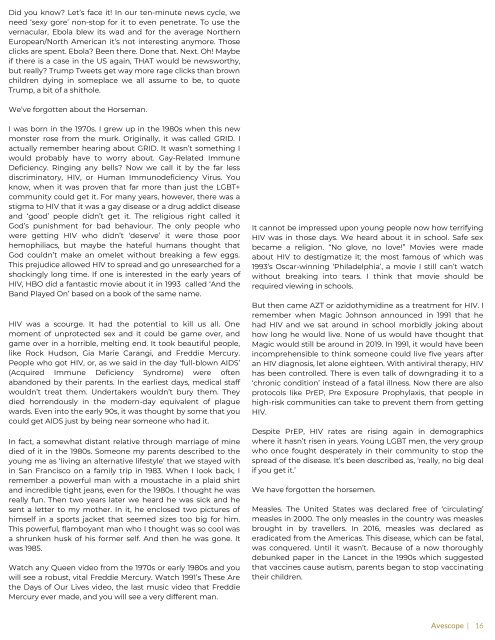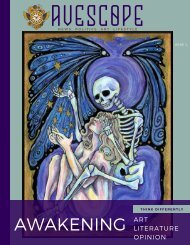Avescope Memento Mori
Avescope Memento Mori. Remember Death. An amazing new magazine about death and remembrance. Art. Photography. History. Fiction. Culture. Poetry. Avescope Memento Mori has it all. This issue is so amazing, it almost makes julienne fries. Thanks to all our contributors: Catherine Clark, Joanna Hatton, Tamsin McKenna-Williams, Catherine Jackson, Blackbird's Photography, Auguste von Osterode, David Simon, Anike Kirsten, Kimm Fernandez, Neva Lee, Tiffany Tong, Matthew Sheetz, Christopher Antim, Karen Lee, LD Towers
Avescope Memento Mori. Remember Death. An amazing new magazine about death and remembrance. Art. Photography. History. Fiction. Culture. Poetry. Avescope Memento Mori has it all. This issue is so amazing, it almost makes julienne fries. Thanks to all our contributors:
Catherine Clark,
Joanna Hatton,
Tamsin McKenna-Williams,
Catherine Jackson,
Blackbird's Photography,
Auguste von Osterode,
David Simon,
Anike Kirsten,
Kimm Fernandez,
Neva Lee,
Tiffany Tong,
Matthew Sheetz,
Christopher Antim,
Karen Lee, LD Towers
Create successful ePaper yourself
Turn your PDF publications into a flip-book with our unique Google optimized e-Paper software.
Did you know? Let’s face it! In our ten-minute news cycle, we<br />
need ‘sexy gore’ non-stop for it to even penetrate. To use the<br />
vernacular, Ebola blew its wad and for the average Northern<br />
European/North American it’s not interesting anymore. Those<br />
clicks are spent. Ebola? Been there. Done that. Next. Oh! Maybe<br />
if there is a case in the US again, THAT would be newsworthy,<br />
but really? Trump Tweets get way more rage clicks than brown<br />
children dying in someplace we all assume to be, to quote<br />
Trump, a bit of a shithole.<br />
We’ve forgotten about the Horseman.<br />
I was born in the 1970s. I grew up in the 1980s when this new<br />
monster rose from the murk. Originally, it was called GRID. I<br />
actually remember hearing about GRID. It wasn’t something I<br />
would probably have to worry about. Gay-Related Immune<br />
Deficiency. Ringing any bells? Now we call it by the far less<br />
discriminatory, HIV, or Human Immunodeficiency Virus. You<br />
know, when it was proven that far more than just the LGBT+<br />
community could get it. For many years, however, there was a<br />
stigma to HIV that it was a gay disease or a drug addict disease<br />
and ‘good’ people didn’t get it. The religious right called it<br />
God’s punishment for bad behaviour. The only people who<br />
were getting HIV who didn’t ‘deserve’ it were those poor<br />
hemophiliacs, but maybe the hateful humans thought that<br />
God couldn’t make an omelet without breaking a few eggs.<br />
This prejudice allowed HIV to spread and go unresearched for a<br />
shockingly long time. If one is interested in the early years of<br />
HIV, HBO did a fantastic movie about it in 1993 called ‘And the<br />
Band Played On’ based on a book of the same name.<br />
HIV was a scourge. It had the potential to kill us all. One<br />
moment of unprotected sex and it could be game over, and<br />
game over in a horrible, melting end. It took beautiful people,<br />
like Rock Hudson, Gia Marie Carangi, and Freddie Mercury.<br />
People who got HIV, or, as we said in the day ‘full-blown AIDS’<br />
(Acquired Immune Deficiency Syndrome) were often<br />
abandoned by their parents. In the earliest days, medical staff<br />
wouldn’t treat them. Undertakers wouldn’t bury them. They<br />
died horrendously in the modern-day equivalent of plague<br />
wards. Even into the early 90s, it was thought by some that you<br />
could get AIDS just by being near someone who had it.<br />
In fact, a somewhat distant relative through marriage of mine<br />
died of it in the 1980s. Someone my parents described to the<br />
young me as ‘living an alternative lifestyle’ that we stayed with<br />
in San Francisco on a family trip in 1983. When I look back, I<br />
remember a powerful man with a moustache in a plaid shirt<br />
and incredible tight jeans, even for the 1980s. I thought he was<br />
really fun. Then two years later we heard he was sick and he<br />
sent a letter to my mother. In it, he enclosed two pictures of<br />
himself in a sports jacket that seemed sizes too big for him.<br />
This powerful, flamboyant man who I thought was so cool was<br />
a shrunken husk of his former self. And then he was gone. It<br />
was 1985.<br />
Watch any Queen video from the 1970s or early 1980s and you<br />
will see a robust, vital Freddie Mercury. Watch 1991’s These Are<br />
the Days of Our Lives video, the last music video that Freddie<br />
Mercury ever made, and you will see a very different man.<br />
It cannot be impressed upon young people now how terrifying<br />
HIV was in those days. We heard about it in school. Safe sex<br />
became a religion. “No glove, no love!” Movies were made<br />
about HIV to destigmatize it; the most famous of which was<br />
1993’s Oscar-winning ‘Philadelphia’, a movie I still can’t watch<br />
without breaking into tears. I think that movie should be<br />
required viewing in schools.<br />
But then came AZT or azidothymidine as a treatment for HIV. I<br />
remember when Magic Johnson announced in 1991 that he<br />
had HIV and we sat around in school morbidly joking about<br />
how long he would live. None of us would have thought that<br />
Magic would still be around in 2019. In 1991, it would have been<br />
incomprehensible to think someone could live five years after<br />
an HIV diagnosis, let alone eighteen. With antiviral therapy, HIV<br />
has been controlled. There is even talk of downgrading it to a<br />
‘chronic condition’ instead of a fatal illness. Now there are also<br />
protocols like PrEP, Pre Exposure Prophylaxis, that people in<br />
high-risk communities can take to prevent them from getting<br />
HIV.<br />
Despite PrEP, HIV rates are rising again in demographics<br />
where it hasn’t risen in years. Young LGBT men, the very group<br />
who once fought desperately in their community to stop the<br />
spread of the disease. It’s been described as, ‘really, no big deal<br />
if you get it.’<br />
We have forgotten the horsemen.<br />
Measles. The United States was declared free of ‘circulating’<br />
measles in 2000. The only measles in the country was measles<br />
brought in by travellers. In 2016, measles was declared as<br />
eradicated from the Americas. This disease, which can be fatal,<br />
was conquered. Until it wasn’t. Because of a now thoroughly<br />
debunked paper in the Lancet in the 1990s which suggested<br />
that vaccines cause autism, parents began to stop vaccinating<br />
their children.<br />
<strong>Avescope</strong> | 16





